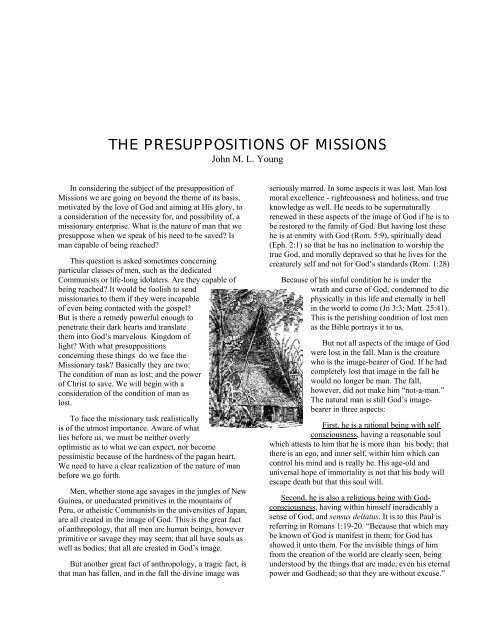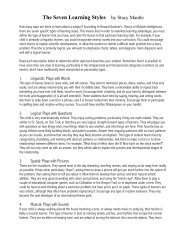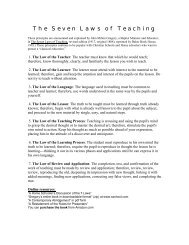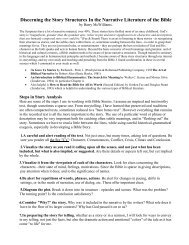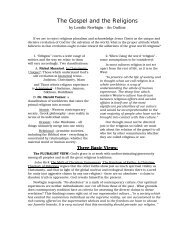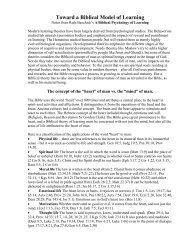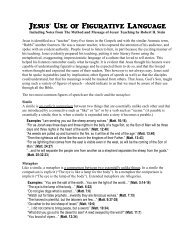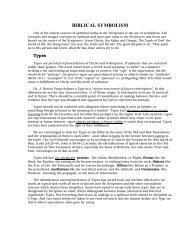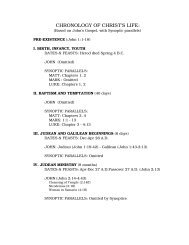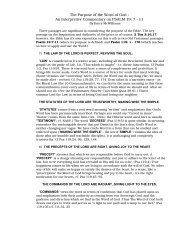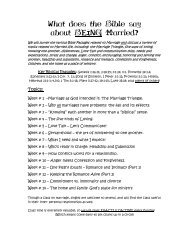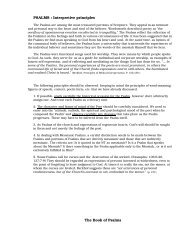THE PRESUPPOSITIONS OF MISSIONS
THE PRESUPPOSITIONS OF MISSIONS
THE PRESUPPOSITIONS OF MISSIONS
Create successful ePaper yourself
Turn your PDF publications into a flip-book with our unique Google optimized e-Paper software.
<strong>THE</strong> <strong>PRESUPPOSITIONS</strong> <strong>OF</strong> <strong>MISSIONS</strong><br />
John M. L. Young<br />
In considering the subject of the presupposition of<br />
Missions we are going on beyond the theme of its basis,<br />
motivated by the love of God and aiming at His glory, to<br />
a consideration of the necessity for, and possibility of, a<br />
missionary enterprise. What is the nature of man that we<br />
presuppose when we speak of his need to be saved? Is<br />
man capable of being reached?<br />
This question is asked sometimes concerning<br />
particular classes of men, such as the dedicated<br />
Communists or life-long idolaters. Are they capable of<br />
being reached? It would be foolish to send<br />
missionaries to them if they were incapable<br />
of even being contacted with the gospel?<br />
But is there a remedy powerful enough to<br />
penetrate their dark hearts and translate<br />
them into God’s marvelous Kingdom of<br />
light? With what presuppositions<br />
concerning these things do we face the<br />
Missionary task? Basically they are two:<br />
The condition of man as lost; and the power<br />
of Christ to save. We will begin with a<br />
consideration of the condition of man as<br />
lost.<br />
To face the missionary task realistically<br />
is of the utmost importance. Aware of what<br />
lies before us, we must be neither overly<br />
optimistic as to what we can expect, nor become<br />
pessimistic because of the hardness of the pagan heart.<br />
We need to have a clear realization of the nature of man<br />
before we go forth.<br />
Men, whether stone age savages in the jungles of New<br />
Guinea, or uneducated primitives in the mountains of<br />
Peru, or atheistic Communists in the universities of Japan,<br />
are all created in the image of God. This is the great fact<br />
of anthropology, that all men are human beings, however<br />
primitive or savage they may seem; that all have souls as<br />
well as bodies; that all are created in God’s image.<br />
But another great fact of anthropology, a tragic fact, is<br />
that man has fallen, and in the fall the divine image was<br />
seriously marred. In some aspects it was lost. Man lost<br />
moral excellence - righteousness and holiness, and true<br />
knowledge as well. He needs to be supernaturally<br />
renewed in these aspects of the image of God if he is to<br />
be restored to the family of God. But having lost these<br />
he is at enmity with God (Rom. 5:9), spiritually dead<br />
(Eph. 2:1) so that he has no inclination to worship the<br />
true God, and morally depraved so that he lives for the<br />
creaturely self and not for God’s standards (Rom. 1:28)<br />
Because of his sinful condition he is under the<br />
wrath and curse of God, condemned to die<br />
physically in this life and eternally in hell<br />
in the world to come (Jn 3:3; Matt. 25:41).<br />
This is the perishing condition of lost men<br />
as the Bible portrays it to us.<br />
But not all aspects of the image of God<br />
were lost in the fall. Man is the creature<br />
who is the image-bearer of God. If he had<br />
completely lost that image in the fall he<br />
would no longer be man. The fall,<br />
however, did not make him “not-a-man.”<br />
The natural man is still God’s imagebearer<br />
in three aspects:<br />
First, he is a rational being with self<br />
consciousness, having a reasonable soul<br />
which attests to him that he is more than his body; that<br />
there is an ego, and inner self, within him which can<br />
control his mind and is really he. His age-old and<br />
universal hope of immortality is not that his body will<br />
escape death but that this soul will.<br />
Second, he is also a religious being with Godconsciousness,<br />
having within himself ineradicably a<br />
sense of God, and sensus deitatus. It is to this Paul is<br />
referring in Romans 1:19-20. “Because that which may<br />
be known of God is manifest in them; for God has<br />
showed it unto them. For the invisible things of him<br />
from the creation of the world are clearly seen, being<br />
understood by the things that are made, even his eternal<br />
power and Godhead; so that they are without excuse.”
In verse 19 we read “known.” In what sense is it known?<br />
It is not a content of knowledge about God natural to all<br />
men, but an awareness that God exists. It is this basic<br />
sense, rooted into his being at his creation, that enables<br />
him to see that general revelation of God in the works of<br />
nature, including himself, for he does see it, Paul says in<br />
verse 20. He sees both that there exists deity and His<br />
eternal power above this created world; and then, as we<br />
shall observe shortly, he sinfully suppresses this truth.<br />
This is the basis of his inexcusableness before God.<br />
Third, man is also a responsible being with moralconsciousness.<br />
Paul is referring to this in Romans 2:14-<br />
15. “For when the Gentiles, which have not the law, do<br />
by nature the things contained in the law, these, having<br />
not the law are a law unto themselves; which show the<br />
work of the law written in their hearts, their conscience<br />
also bearing witness, and their thoughts the meanwhile<br />
accusing or else excusing one another.” What is man’s<br />
conscience? Is it not his consciousness that he ought to do<br />
right and ought not to do wrong? This is implanted in all<br />
men making them moral creatures and distinguishing<br />
them from the animals. It is not that the heathen innately<br />
know correctly what is right and wrong. They even<br />
acknowledge that gross evil is deserving of punishment,<br />
Paul says in Romans 1:32, but they suppress this voice<br />
and go on in sin.<br />
In this we see also the nature of unbelief. It is the<br />
nature of man’s unbelieving condition to<br />
suppress all truth that would point him to<br />
God. In Romans 1:18 the Greek verb for<br />
“hold” has a prefix giving the meaning of<br />
“hold down”, or to restrain. Men suppress the<br />
knowledge of God within them; they do not<br />
want to respond to His revelation of Himself<br />
in nature. This revelation will never lead the<br />
heathen to God because of this sinful reaction<br />
of unbelief causing them to suppress truth<br />
pointing to God.<br />
Yet the revelation is there and the God-consciousness<br />
is universally in man. Paul took advantage of this in<br />
Athens when he began his sermon with a reference to<br />
their altar to the “Unknown God.” There is no known<br />
instance where it has been established, that men have had<br />
no knowledge of God. In Manchuria in 1940 as a<br />
missionary the writer once made a trip back into the<br />
northeastern mountains where conditions were very<br />
primitive. We had taken our bicycles on the train, had<br />
gotten off about 100 miles to the east of Harbin and had<br />
ridden north. The Japanese who occupied the country<br />
then did not go into that area but stayed along the railway,<br />
fearing guerrilla attacks. I recall on one occasion a<br />
Chinese farmer asking if I were a Japanese. They had<br />
seen either Japanese nor white men back there. We sold<br />
gospel portions, gave out tracts and witnessed of God<br />
and His salvation through Christ. Sometimes I would<br />
ask whom they worshipped and usually they would<br />
point to some pagan temple where nature gods were<br />
worshipped. When I asked if they did not believe there<br />
was some God who was far above and superior to all<br />
these, inevitably they would reply that there was such a<br />
one Lao Tien Yeh, the Venerable Heavenly One. But<br />
when I asked if they worshipped Him, the reply was<br />
usually a looking from one to the other, a shaking of<br />
the head, and an admission that they did not. The<br />
consciousness of a supreme deity was not foreign to<br />
them, but this they set aside, and worshipped and<br />
served the creature rather than the Creator.<br />
The moral-consciousness is there in men also. Quite<br />
vivid in my memory are the many Sunday nights I sat<br />
down with a group of young Japanese university<br />
students in Tokyo with an open Bible. They were<br />
youths of keen intelligence but all of them espoused the<br />
Marxist ideology. On a number of occasions we studied<br />
what Paul had to say in Romans 1 and on one such<br />
night the question came up as to who set the standards<br />
of right and wrong. Their consensus was that these<br />
were made by human convention but that basically that<br />
which speeded the cause of socialism was good and<br />
that which impeded its progress was evil. Endeavoring<br />
to make them take a more personal view of it, I asked<br />
them if they cheated in their exams.<br />
Looking somewhat sheepish they all<br />
admitted they did, but all defended it on<br />
the basis that everyone did, and that it<br />
hastened them on their way into the world<br />
and the struggle for the conquest of<br />
socialism!<br />
Coming home that night my thought<br />
were not happy ones. Could it be possible<br />
that these godless youths had succeeded<br />
in eradication the image of God from<br />
them? Was it really gone? Yet in my heart I knew this<br />
was not possible. And then one of the young women of<br />
the class who was riding the train part way with me<br />
turned and said, “You were right, teacher, when we<br />
know we should do; and again we do what we feel in<br />
our hearts is not right. We have no good, unchanging<br />
standards to follow. I want to believe in god and accept<br />
His standards you have been teaching us from the<br />
Bible.” No, the image was not effaced. Indeed, on the<br />
whole I have found it easier to deal with these young<br />
minds who glibly deny all God-consciousness and<br />
moral-consciousness, than with those who for five, six,<br />
or seven decades responded to this inner testimony but<br />
perverted it by worshipping idols for gods.
Due to the operation of God’s common grace,<br />
however, man’s work of suppressing the truth is in turn<br />
counteracted by God. Common grace is an attitude of<br />
favor of God upon men as men, not upon them<br />
specifically as saved or unsaved. It has a two-fold work.<br />
In part, it is God’s grace in restraining the heathen from<br />
realizing their full potential for evil. It is being as wicked<br />
as they are capable of being. But it also has another<br />
function. It is God’s common grace that “makes his sun to<br />
rise on the evil and on the good, and sends rain on the just<br />
and the unjust” (Matt.5:45). He thus gives men the<br />
opportunity to realize that God is good and longsuffering<br />
to sinful men. He sends His good gifts to them<br />
all that they might turn to Him. But they won’t. Common<br />
grace also enables them to do acts of civil righteousness,<br />
such as love their families and nations. Their reaction,<br />
however, due to the nature of unbelief, is always to<br />
suppress the truth of this witness of God to them.<br />
Therefore they are without excuse! The heathen are not<br />
yearning for God and for His Christ but are rather<br />
resisting the witness of general revelation and common<br />
grace.<br />
But we do have a point of contact in our witness to<br />
them. They are still men, in the image of God, in these<br />
important, unchanging aspects. No matter how low they<br />
may fall into bestiality they are still men; still conscious,<br />
at least to some small extent, of their need and with some<br />
yearning to rise above their plight. If they were not men<br />
in the image of God we could not communicate to them.<br />
The very presupposition of Missions is that they have a<br />
God-consciousness and so we can speak to them of God.<br />
We do not begin our witness to them in a void, but with<br />
the knowledge God has already spoken to them and is<br />
speaking to them.<br />
It is not that we can simply build on<br />
their sense of God and bring them to God<br />
merely by giving them more information!<br />
No. It will only be rejected unless our<br />
witness in accompanied by the sovereign<br />
act of God’s Holy Spirit in regenerating<br />
them. Not common grace but special<br />
supernatural grace is needed to bring men<br />
into His Kingdom.<br />
Since we have a point of contact, or<br />
perhaps a point of attack, we can talk to<br />
them. We can witness and we can reason.<br />
We can tell them of the God of creation and providence<br />
and know that these are not meaningless concepts to<br />
them. We can go on to show them the traditional<br />
arguments for the existence of God, that the God we<br />
postulated from the Bible exists, and know that this will<br />
strike a responsive cord in their hearts even if they<br />
proceed to suppress it.<br />
This method of witness is useful to teach them more<br />
of God, man and the universe, and their true<br />
relationship, and to drive the one opposing the truth<br />
further into the corner of illogic and contradiction. But<br />
we must remember that the door to the Kingdom of<br />
God is not opened by the power and persuasion of<br />
human reasoning alone, nor by any other human effort<br />
alone. Admissions forced against the will, leave the<br />
mind of the same opinion still. Nominal head assent is<br />
still heart rejection. The kicking against the pricks of<br />
the reasoning which is goading them into a corner soon<br />
begins again in some other direction. Why? Because<br />
men are not argued into the Kingdom of God. They<br />
have to be born into it.<br />
Yet such reasoning is of great value when done in a<br />
spirit of love for the unbeliever. If he has set his mind<br />
and ideas on a throne of rebellion against God he must<br />
be humbled by having those ideas defeated if he is to<br />
yield to God. The yielding will not follow without the<br />
gracious work of the Holy Spirit, however, which we<br />
must pray for as we witness. Paul effectively used a<br />
reasoning approach in his Athens sermon, which we<br />
will deal with on another occasion. But Paul in 1<br />
Corinthians 1 shows the presuppositions behind his<br />
preaching in verses 22-24. “For the Jews require a sign,<br />
and the Greeks seek after wisdom. But we preach<br />
Christ crucified, unto the Jews a stumbling block, and<br />
unto the Greeks foolishness; but unto them which are<br />
called, both Jews and Greeks, Christ the power of God,<br />
and the wisdom of God.” The Greeks wanted wisdom,<br />
and Paul was willing to reason with them, but it is only<br />
Christ who is the power of God who changes men’s<br />
lives. This brings us then to the other basic<br />
presupposition of Missions we must consider, that is,<br />
the power of Christ to save through His<br />
gospel.<br />
In 1 Corinthians 1:24 we see that this<br />
was the presupposition of Paul’s<br />
preaching—that the gospel of Christ was<br />
completely adequate to save sinful men<br />
and would save all that God would call.<br />
He had witnessed that power in operation<br />
from the beginning of His preaching.<br />
When he and Barnabas turned to preach<br />
to the Gentiles we read in Acts 13:47-48,<br />
“For so has the Lord commanded us,<br />
saying, I have set you to be a light of the<br />
Gentiles, that you should be for Salvation unto the ends<br />
of the earth. And when the Gentiles heard this, they<br />
were glad, and glorified the word of the Lord: and as<br />
many as were ordained to eternal life believed.” God<br />
had His own elect, chosen before the foundation of the<br />
world, and when Paul preached the gospel to them,<br />
God called them into faith.
This must be the hope and expectation of every<br />
missionary preacher. With men dead in trespasses and<br />
sins, in rebellion against God’s truth, preaching would be<br />
futile if it were not for the power of God’s calling, the<br />
supernatural internal call which God gives, in His own<br />
time to His elect, when the external call of the gospel<br />
goes out. In Ephesians 1 Paul is talking about the subject<br />
of election, predestination and calling. He says, in verses<br />
18-19, he prays that they might know the hope of God’s<br />
calling and “ the exceeding greatness of His power to<br />
usward, who believe according to the working of His<br />
mighty power that called ones believe. Without the<br />
operation of the Holy Spirit in regeneration none could<br />
enter the Kingdom.<br />
The presupposition of God’s election is behind our<br />
preaching to spiritually dead men. The doctrine of<br />
election thus if properly understood is not a handicap to<br />
evangelistic zeal but its stimulus. We preach because we<br />
know it is not hopeless. God’s elect must hear and He<br />
will save them. They are many and in all places, and their<br />
salvation awaits our coming with the gospel. It is our<br />
responsibility to reach them with it.<br />
The doctrine of election ought not to be preached to<br />
Christians only to comfort and reassure them. When it is<br />
presented it should be followed with an equal emphasis<br />
on the Christian’s responsibility which springs from his<br />
election. We are elected and save to serve<br />
(Eph. 2:8-10). Paul, after emphasizing to<br />
these Ephesian Christians the matter of<br />
their salvation by God’s sovereign grace<br />
in 2:8-9, immediately reminds them of<br />
this in verse 10. “For we are His<br />
workmanship, created in Christ Jesus unto<br />
good works, which God has before<br />
ordained that we should walk in them.”<br />
The doctrine of election should be a<br />
stimulus to good works and especially to<br />
that of witnessing.<br />
The power of Christ working through His gospel is<br />
adequate to save any man of any nation. Paul is so saying<br />
in Romans 1:16, “For I am not ashamed of the gospel of<br />
Christ: for it is the power of God unto salvation to every<br />
one that believes; to the Jew first, and also to the Greek.”<br />
Negatively stated, it is not education nor modern<br />
science which can transform men’s lives from sinners to<br />
saints. Nor western civilization and culture. These not<br />
infrequently have a worse effect, increasing crime and<br />
juvenile delinquency in heathen lands. Nor can the<br />
principles of democratic government and the moral and<br />
legal codes of western democracies deliver men from<br />
spiritual darkness.<br />
Putting it positively, there is only salvation in the<br />
name of Christ and the gospel which bears His name.<br />
Only He can break the bondage of sin. It is the faithful<br />
preaching of His Word which is needed on the mission<br />
field today. The power is in the gospel as the Holy<br />
Spirit uses it. It does not need to be accompanied by<br />
any show of miracles or unintelligible babble of<br />
tongues.<br />
I recall a few years ago in Japan a small group of<br />
discouraged missionaries leaving their work, and some<br />
their Missions, and going to the mountains to pray for<br />
some manifestation of supernatural power to make<br />
them more effective preachers. Others followed until<br />
about thirty-five were gathered. They did not<br />
preaching—only continuing in prayer and waiting. The<br />
weeks passed into months and the months to years<br />
without witnessing. Wasted opportunities! Finally, after<br />
two years, they dwindled down, some taking up secular<br />
work teaching English in colleges and others returning<br />
to the United States. They gave up, defeated! Others<br />
turned to spiritual pride. One claimed he was so<br />
advance he did not need to read the Bible any more!<br />
They made shipwrecks of their missionary<br />
ministries because they did not trust the adequacy of<br />
the power of the gospel, nor the way the Lord was<br />
using it! We must preach the gospel and leave the<br />
results to Him. That is His responsibility. If<br />
the heathen will not hear the gospel they will<br />
not believe though one went back to them<br />
from the dead, our Lord declared. It is not<br />
miracles but faithful preaching of the gospel,<br />
the power of God, which is needed. Then the<br />
invisible miracle of regeneration will take<br />
place and visible fruit will follow. Let us<br />
understand the basis and presupposition of<br />
Missions that we may not be deceived by<br />
unlearned men nor discouraged by<br />
difficulties and slow growth. Men’s hearts<br />
are hard but God’s Word is powerful and “in due<br />
season we shall reap if we faint not.”<br />
From The Motive and Aims of Missions, Part I:<br />
Chapter 2 by John M. L. Young, (1964)


